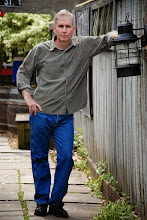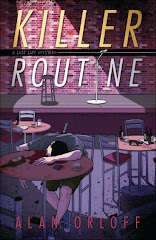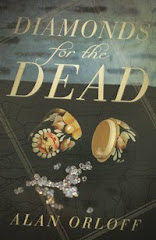We're asked a lot about how we write, but less about how we edit. How do you know what to change and when to stop?
 When I type “The End” on a draft, it’s a great feeling, for sure. I exhale deeply, crack my knuckles, and unclench every muscle in my body. Yet, there’s a small, squeaky voice in the back of my head, whispering, “You know you’re not finished, bucko. You know the pain is just beginning.”
When I type “The End” on a draft, it’s a great feeling, for sure. I exhale deeply, crack my knuckles, and unclench every muscle in my body. Yet, there’s a small, squeaky voice in the back of my head, whispering, “You know you’re not finished, bucko. You know the pain is just beginning.”
I do know that, but I still savor the moment. After a brief period of celebration, I stuff my manuscript in the proverbial drawer for a cooling-off period. Could be a couple days, could be a couple weeks. Could even be longer (I think I’ve got one still chilling in my drawer from 2009).
When I’m brave enough, I pull it out and the revision process can commence. First thing, I’ll reread the entire manuscript, all the way through. I generally realize it’s not as bad as I thought (in spots) and not as good as I thought (in other spots). One thing I do know: it will be very uneven. There will be plot holes and timeline issues. (I once had a day contain about 36 hours. Another time, I’d set a roaring fire in a fireplace, but it was the middle of summer.)
On my read-through, I take copious notes.
After the initial read, I’ll go back and fix things. What do I change? Everything that “doesn’t work.”
When I write the first draft, I write linearly—straight on through, no editing. When I revise, I jump around, usually fixing the bigger stuff first. I find that sometimes it’s an iterative process. Changes in one spot will prompt changes in another spot, and this, in turn, will force me to go back and change things some more.
After that, I’ll make a few separate editing passes, mostly to address specific things. The next time through is usually for the plot. Does it make sense? Does it hold together? Are there gigantic holes or flaws in logic? At this stage, I’ll map everything on a timeline to make sure it all works within the constraints of the universe
Next time through, I read for characterization. Are the characters consistent? Are their motivations sound?
Then I’ll beef up the dialogue, or the descriptions, or the settings, or any of a dozen other things.
At some point, I need to lock down some of that research I’ve put off (place names, dates, esoteric stuff that requires some one-on-one time with Mr. Google).
As I go, anything that gets deleted gets dumped into a “clips” file. Who knows, I may change my mind and put it back into the manuscript, or I may find a way to repurpose it in another work. Those words don’t always come easy, so if I can recycle them, I’ll do it!
When I write a draft, I don’t include chapter breaks; I usually wait until I’m pretty far along in the revision process before doing that.
I also don’t polish the prose until sometime toward the end of the process. (No sense doing it earlier, especially if you’ll be deleting a lot of prose along the way). I always make sure to search on my crutch words (just, pretty, that, maybe, etc.), run spell/grammar check, make sure the formatting is okay, and other important stuff.
After the manuscript is “ready,” I give it to some beta readers. When I get their comments, I start the process all over again. All. Over. Again.
When do I stop revising? I guess when the changes I make simply make the manuscript different and not better.
(This entry is “simul-posted” on Criminal Minds.)



































